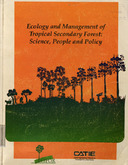Ecology and management of tropical secondary forest: science, people, and policy. Proceedings
ISBN
978-9977-57-318-29977-57-318-2
Date
1998Author
Unknown authorAutor Corporativo
CATIE - Centro Agronómico Tropical de Investigación y Enseñanza
Type
Reunión
Metadata
Show full item recordDescription
Ilus. Tab. Bib. Sum. (En)
Abstract
Secondary forests developing on agricultural land after it is abandoned, or as the fallow period in systems of subsistence agriculture, are an increasingly important component of the forest resources of the tropics. They fix and store carbon and may contribute to the alleviation of global warming, they are refuges for biodiversity in agricultural landscapes, and they are low-cost sources of a tremendous variety of forest products. The final years of the 20th century represent an opportune time to bring together researchers concerned with biological, ecological, social/organizational, financial/economic and political aspects of secondary forests and their management, to share their experiences and opinions concerning secondary tropical forests and to contribute to the development of a forward-looking, cross-disciplinary research agenda. The conference had the following objectives: 1) to summarize the state of knowledge of tropical secondary forests from the standpoint of the ecological, social and political sciences. 2) to report the most recent results of research on secondary forests from all relevant disciplines.
Keywords
Delegation
Sede Central
Publisher
CATIE, Turrialba (Costa Rica). IUFRO, Viena (Austria) CIFOR, Bogor (Indonesia). WWF, Gland (Suiza) GTZ, Eschborn (Alemania)
URI (Permanet link to cite or share this item)
https://repositorio.catie.ac.cr/handle/11554/1298Collections
- Publicaciones y documentos [4422]


